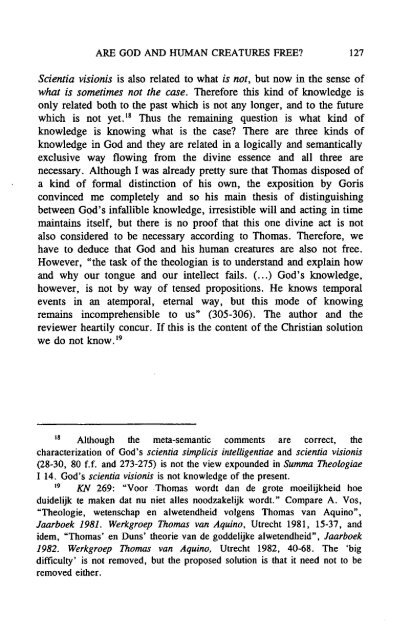Jaarboek Thomas Instituut 1997 - Thomas Instituut te Utrecht
Jaarboek Thomas Instituut 1997 - Thomas Instituut te Utrecht
Jaarboek Thomas Instituut 1997 - Thomas Instituut te Utrecht
Create successful ePaper yourself
Turn your PDF publications into a flip-book with our unique Google optimized e-Paper software.
ARE GOD AND HUMAN CREATURES FREE? 127<br />
Scientia visionis is also rela<strong>te</strong>d to what is not, but now in the sense of<br />
what is sometimes not the case. Therefore this kind of knowledge is<br />
only rela<strong>te</strong>d both to the past which is not any longer, and to the future<br />
which is not yet. 18 Thus the remaining question is what kind of<br />
knowledge is knowing what is the case? There are three kinds of<br />
knowledge in God and they are rela<strong>te</strong>d in a logically and semantically<br />
exclusive way flowing from the divine essence and all three are<br />
necessary. Although I was already pretty sure that <strong>Thomas</strong> disposed of<br />
a kind of formal distinction of his own, the exposition by Goris<br />
convinced me comple<strong>te</strong>ly and so his main thesis of distinguishing<br />
between God's infallible knowledge, irresistible will and acting in time<br />
maintains itself, but there is no proof that this one divine act is not<br />
also considered to be necessary according to <strong>Thomas</strong>. Therefore, we<br />
have to deduce that God and his human creatures are also not free.<br />
However, "the task of the theologian is to understand and explain how<br />
and why our tongue and our in<strong>te</strong>llect fails. (... ) God's knowledge,<br />
however, is not by way of <strong>te</strong>nsed propositions. He knows <strong>te</strong>mporal<br />
events in an a<strong>te</strong>mporal, e<strong>te</strong>rnal way, but this mode of knowing<br />
remains incomprehensible to us" (305-306). The author and the<br />
reviewer heartily concur. If this is the con<strong>te</strong>nt of the Christian solution<br />
we do not know. 19<br />
18 Although the meta-semantic comments are correct, the<br />
charac<strong>te</strong>rization of God's scientia simplicis in<strong>te</strong>lligentiae and scientia visionis<br />
(28-30, 80 f.f. and 273-275) is not the view expounded in Summa Theologiae<br />
I 14. God's scientia visionis is not knowledge of the present.<br />
19 KN 269: "Voor <strong>Thomas</strong> wordt dan de gro<strong>te</strong> moeilijkheid hoe<br />
duidelijk <strong>te</strong> maken dat nu niet alles noodzakelijk wordt." Compare A. Vos,<br />
"Theologie, we<strong>te</strong>nschap en alwe<strong>te</strong>ndheid volgens <strong>Thomas</strong> van Aquino",<br />
<strong>Jaarboek</strong> 1981. Werkgroep <strong>Thomas</strong> van Aquino, <strong>Utrecht</strong> 1981, 15-37, and<br />
idem, "<strong>Thomas</strong>' en Duns' theorie van de goddelijke alwe<strong>te</strong>ndheid", <strong>Jaarboek</strong><br />
1982. Werkgroep <strong>Thomas</strong> van Aquino, <strong>Utrecht</strong> 1982, 40-68. The 'big<br />
difficulty' is not removed, but the proposed solution is that it need not to be<br />
removed either.








